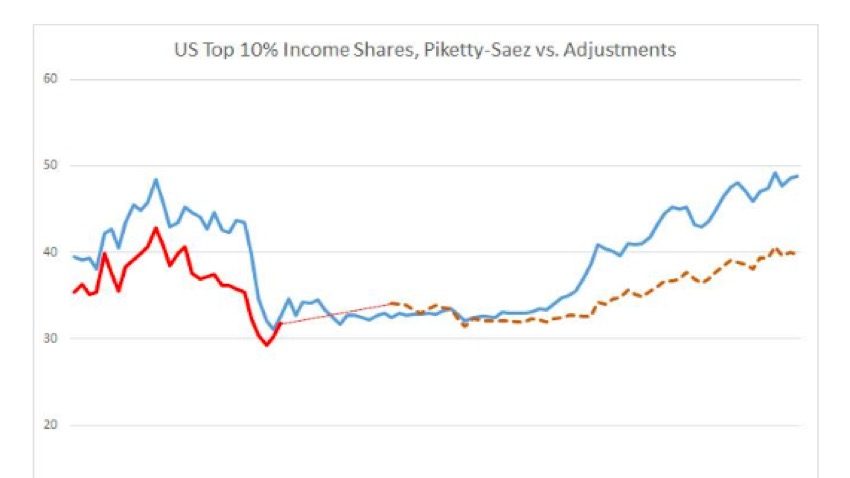Phillip Magness: Is Economic Inequality Spiraling out of Control?
Within the last several weeks, a Twitter war has raged, involving the three French economists Piketty, Saez, and Zucman (PSZ) who recently released a free book on justice-based reasons for imposing a wealth tax on the ultra-rich.

On November 6, Dr. Paul Mueller introduced a visiting economics scholar, Dr. Phillip Magness. Magness is a senior research fellow at the American Institute for Economic Research, an outfit based in Great Barrington, Mass., which publishes on current and historical economic debates. Magness has authored multiple pieces on economic history, taxation, education, the history of slavery, and economic inequality.
Magness’s lecture was part of a year-long series of lectures, symposia, and discussions organized by Dr. Paul Mueller, assistant professor of economics at King’s. During each semester of the 2019-2020 academic year, Mueller hosts a senior scholar and two to four junior scholars, with the goal of connecting these scholars with students and faculty in both formal and informal settings. Besides the speaker series, these grant-funded events also include a student reading group and student research assistant hours. This grant expands upon similar grants Mueller received in previous years. Before Magness, Mueller had hosted two scholars to speak on economics. Dr. Jason Jewell visited from Faulkner University on September 27, and Dr. Dan Klein visited from George Mason University on October 10.
Hope Feller (PPE ’21) said, “Phil Magness offered an easy-to-follow rebuttal to common modern headlines. . . He focused on defending capitalism by looking at data and explaining it to us, showing how headlines screaming ‘Wealth Inequality’ are purposely misleading and not something we need to be overly concerned about.”
Within the last several weeks, a Twitter war has raged, involving the three French economists Piketty, Saez, and Zucman (PSZ) who recently released a free book on justice-based reasons for imposing a wealth tax on the ultra-rich. Both free market conservative commentators and the center Left consider their tax proposal to be radical.
According to Zucman and Saez, the bottom 50% of earners in the United States now pay a higher overall tax rate than multimillionaires. However, the statistics presented by these Berkeley economists have come under great scrutiny.
Magness went about re-examining the assumptions behind the PSZ statistics to reconstruct them more accurately. First, Magness presented the simple equation for measuring inequality:
Personal income (or wealth) of top 1%
——————————————————————— = Inequality
Total income (or wealth) earned in US Economy
(national accounts)
Magness argued that PSZ’s method for measuring inequality is faulty: “Built into their entire study is an erroneous denominator that covers the entire century.” Thus, their proposals to impose high wealth taxes are based on incorrect calculations.
Magness explained that the Saez-Zucman statistics: “are systematically undercounting adjusted gross income and therefore overcounting income concentration, and they’re doing it at very unequal rates.” In order to have a clean equation, Magness noted that there must be consistency. The “IRS was pretty horrendous in underreporting income,” Magness said. Before 1943, the IRS statistics were highly inaccurate, since the amount of income tax due was self-reported and tax evasion was common. Thus, even when tax rates were high during this period, few people actually paid it all. The method was harmonized in 1943, when the government started deducting directly from the payroll as well as changing the way accounting was done on the tax system.
Magness worked to gather more accurate data from before 1943, and pulled in the Auten and Splinter research to create an apples to apples comparison across the century. His research yielded the following chart:
This chart shows that the numbers do fluctuate, but almost for the entirety of the century, the share of income owned by the top 10% falls between +/- 35% with an upper boundary of 40% and a lower boundary of 30%. The punchline? “The u-curve of inequality that is supposedly driving this debate is actually a tea saucer.” While PSZ shows relentless climbing, other studies, like those of the Federal Reserve, indicate a minor, but historically normal, rise.
So, is inequality spiraling out of control? According to Magness, it is only slightly rising and this rise is entirely within historical norms. Did tax cuts cause inequality to rise? Again, Magness says no. Inequality is minor if you correct the system of measurement and also consider the fact that widespread tax evasion occurred during periods of high tax rates. And finally, are the PSZ statistics accurate? According to everything Magness presented, no.
The PSZ trio has influenced Elizabeth Warren to adopt a tax proposal that would impose a wealth tax (as opposed to income tax) as high as 6% upon the most wealthy Americans. This would mean that if you’re Jeff Bezos, you would owe 8 billion dollars in taxes to the government in one year, calculated based on total wealth, not the year’s earnings.
George Orwell’s warnings about politicians using language to mislead and confuse may be germane here. For instance, while Warren claims that Medicare for all will not increase taxes, that’s only because she doesn’t count appropriating private insurance premiums as a tax. While this plan dodges the word “tax,” it infers it. Also, the statistics linking tax cuts with inequality rest on suspicious statistics.
Jan Gerber (PPE ’21) said, “The main takeaway from the lecture was that data awareness is not just a prerogative of elite economists (and clearly even they can be biased) but is in fact a civic duty. If a political candidate says that sky-high taxes are what justice demands, then only an informed American can make the right moral decision.”





